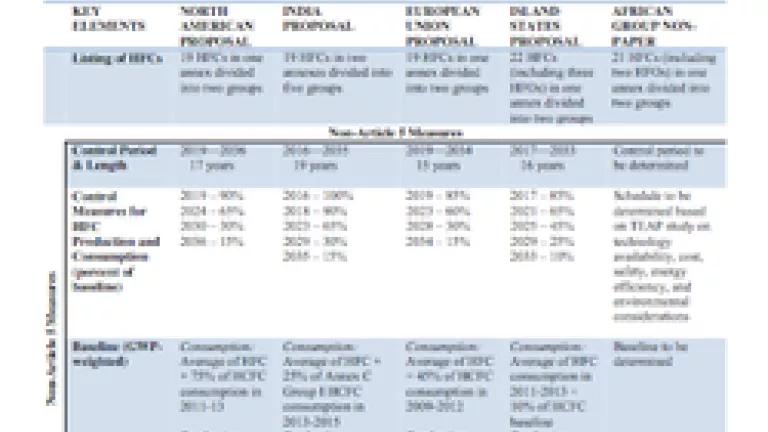Progress on Phasing Down HFCs as Countries Build Momentum Toward a Deal - Summary of Amendment Proposals

Co-authored by Alexander Hillbrand (NRDC Analyst) and Morgan Capilla (NRDC Stanback Fellow)
The global effort to phase down powerful heat-trapping hydrofluorocarbons (HFCs) is gaining speed as several nations recently put forth detailed plans to curb HFC use. Negotiators at the upcoming Open-Ended Working Group (OEWG) in Paris next month will weigh in on updated amendment proposals from North America, India, the European Union, and the Island States.
With support from China, Brazil, the African Group, and nearly all of Latin America and Asia, momentum is building toward reaching an agreement to phase down these super pollutants, which have up to 10,000 times the impact of CO2 pound-for-pound.
A summary chart by NRDC, Council on Energy, Environment and Water (CEEW), and Institute for Governance and Sustainable Development (IGSD) with inputs from experts, such as Steve Seidel and others, highlights the key features of each Montreal Protocol amendment proposal and the African Group's non-paper draft submission. Click on the thumbnail at right for the summary chart.
Key features of all amendment proposals, as summarized in the chart are:
- Substances: All amendment proposals list HFC substances and divide them into groups.
- Baselines: All amendment proposals define a separate baseline for developed and developing countries - the former relative to past years and the latter relative to past or future years.
- Reduction Schedules: All amendment proposals implement controls as percentage reduction steps below the baseline, separate for developed and developing countries. Schedules for developing countries offer a "grace period" delay beyond the timeframe for developed countries.
- Financing: All amendment proposals require degrees of transitional cost support for developing countries from the Multilateral Fund.
- Exceptional Provisions: Several amendment proposals address the possibility that HFC alternatives may not be promptly available in certain applications and that secondary transitions may be necessary.
Provided that opposition from Saudi Arabia and a few other Gulf countries doesn't stall negotiations, the upcoming meeting in Paris next month holds promise of progress and a "contact group" being formed to hammer out specifics of an agreement. Making such headway could lead to a signed agreement in Dubai in November and historic action against these dangerous pollutants.
Summary Chart of 2015 Montreal Protocol Amendment Proposals
Shannon Dilley and Bhaskar Deol also contributed to the post.
